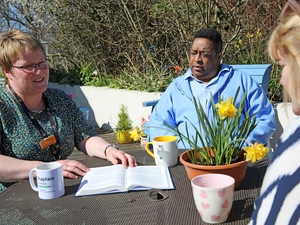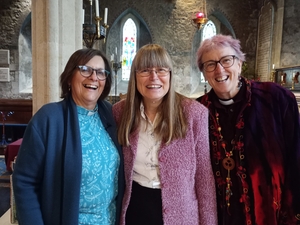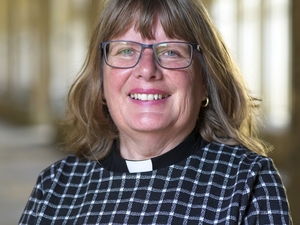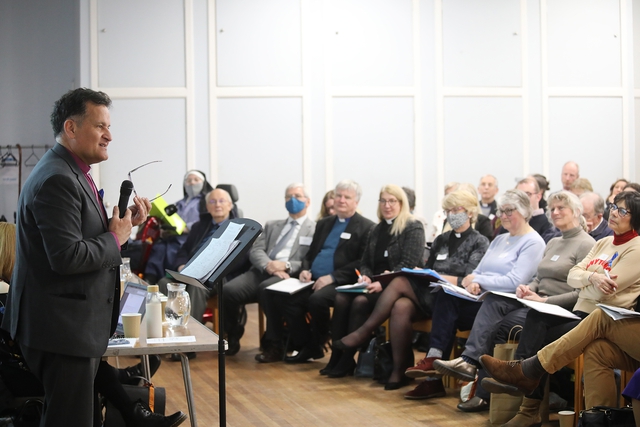- the meetings about each specific deanery;
- deanery events to consider our finances and the final draft of our Diocesan Plan in the autumn; and
- a Diocesan Synod in November 2022 to agree our budget for 2023 and a budget framework for the next three years.
-

21 October 2025
Chaplains are integral to hospice care
Chaplains are integral to the care that hospices give to their patients, families and staff. ... read more
-

16 October 2025
New pioneer minister commissioned on island
Ali Mascarenhas was commissioned as a lay pioneer in a special service at St Mary’s ... read more
-

13 October 2025
New priest appointed for Hayling Island
Bishop Jonathan has appointed a new associate priest to work in the parish of Hayling ... read more
Bishop offers us roadmap for 2022

BISHOP Jonathan has invited us to pray and work together, as we shape a future vision for our diocese.
Our new bishop told Diocesan Synod members that he thought confidence in Jesus and each other was the most important issue for our diocese to grapple with.
Having spent the past three weeks listening to clergy and lay people in parishes and communities across all seven of our deaneries, he concluded that our strategy thus far – however well-intentioned – hadn’t given parishes long enough for meaningful dialogue to plot the way forward.
And he suggested that we might look again at our deaneries’ plans for mission and ministry with two additional proposals. One is that we should create Anna Chaplains to support older people in every parish of the diocese. The other is to deliberately prioritise our work with children, young people and young adults to bring the gospel to the emerging generation.
He will meet with archdeacons, area deans and lay chairs – plus our Diocesan Secretary and Deputy Diocesan Secretary – to discuss each deanery individually between now and May. They’ll work out how to look at existing deanery plans through the prism of his proposals, and to ask in the light of that: “What kind of ministry do we need in this context?”
His first Presidential Address to our Diocesan Synod explored what might be described as the “wolf at the door” – the top priority for action in his new role. He said issues such as Ukraine, safeguarding, post-pandemic tiredness, our vision, and a focus on children and young people were all vitally important. But none of them was the major issue to grapple with first.
"I think our wolf at the door is a lack of trust – broken trust in some cases and quarters," he said. "We lack confidence in one another. But in, with and under the question of broken trust is the deeper question of confidence in Jesus Christ. Is Christ enough? And are we enough for the ministry to which he calls us?
"Here’s the wolf at the door, the real threat: that we lose confidence in Christ’s beckoning and sufficiency, in his call. If we lose confidence in Christ, we can sometimes find ourselves thinking that the work of the Kingdom must be down to us: “is the future of the Church, is the hope of the Church down to us?” I want to say absolutely not, as clearly as I can, otherwise we really are in trouble!
"The future and the hope of the Church – and of the world – is Jesus Christ, risen, in our midst, alive and at large in the world, and beckoning us to join in. Beckoning us, not to see ourselves as having our own ministries, but rather receiving the gift through the Spirit of participating in his ministry."
He invited synod members to pray alongside him during Holy Week about building that confidence, remembering that the Church’s ministry is God’s before it is ours. He also suggested that we should bring any hurt or bitterness we’ve been carrying before God, and that some debt release and forgiveness for each other might be appropriate as we move forward.
And he presented a roadmap for the rest of 2022, which includes:
“I will not be asking you to start something afresh,” he said. “I welcome what you’ve done, and there is so much to celebrate already. I’m here to understand, enable and challenge you, but it’s your ministry, your service of Christ that we delight in.
“The vision I want to offer is a diocese where everyone belongs, older and younger, but in which we have made a commitment to offer life-enhancing encounters with Jesus Christ to children, young people and young adults. We need to be intentional about offering a new generation the chance to find the love that has enthralled us.
“Anna Chaplaincy is a beautiful, growing movement to develop the spirituality of older people. It is based on the ministry of Anna, who saw the infant Jesus in the temple and praised God for the Messiah. It helps us to show the value of the older generation, and gives lay pastors authority to visit people in their own homes and minister to them.
“We then ask what kind of ministry we need to deliver these things? How can we weave these things into existing deanery plans? There is no one-size-fits-all answer: in some places it might be more vicars, in another place you may need fewer vicars, and to pay a wage and house people to lead family work or other ministry.
“The Church needs to worry less about whether it will survive and instead worry about issues on which the gospel has much to say: mental health, poverty, the survival of our planet. Paradoxically, our attractiveness comes not when we focus on bums on seats. Our attractiveness actually comes by spending as much time as possible with Jesus, because then his concerns about our world and its people will rub off on us.”